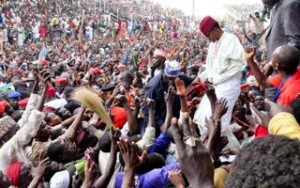 On 21st of December, 2014, the Peoples Democratic Party, PDP held a fundraising dinner at the Presidential Villa in Abuja. In a few frenetic hours, over N21bn was raised. One hitherto unknown Tunde Ayeni, who was chairman of the occasion, opened the floor by donating the sum of N2bn. He said N1bn was from himself and his partner, while the other N1bn was from “friends” whom he did not name.
On 21st of December, 2014, the Peoples Democratic Party, PDP held a fundraising dinner at the Presidential Villa in Abuja. In a few frenetic hours, over N21bn was raised. One hitherto unknown Tunde Ayeni, who was chairman of the occasion, opened the floor by donating the sum of N2bn. He said N1bn was from himself and his partner, while the other N1bn was from “friends” whom he did not name.
Oil and gas executives gave N5 billion, while real estate and building chiefs donated N4 billion. The transport and aviation sector donated N1 billion; food and agriculture N500 million; power N500 million and construction N310million. A total of N250 million came from road construction, while Shelter Development Limited gave N250 million. PDP governors announced a donation of N50 million each, amounting to N1.05 billion. Former geography teacher, Jerry Gana and ‘friends’ dropped N5bn into Jonathan’s reelection kitty.
In the face of opprobrium, the usually unabashed PDP went on the defensive and claimed that the amount of money was not meant for election activity alone, but also for the construction of its headquarters building. I do not know when it became the responsibility corporate interests and businesses to build offices for political parties, but that is what the party said. The only surprise is that Julius Berger has not ‘volunteered’ a befitting party headquarters to the ruling party.
If the over N21 billion raised by the PDP was all there was to the matter, it wouldn’t have been a problem, considering that even the Independent National Electoral Commission, INEC – whose duty it is to monitor election expenses of parties – didn’t complain about the clear breach of electoral laws. However, insiders, political observers and media experts all agree N21bn is ‘chicken change’ compared to what PDP – directly or by proxy – has actually spent on the upcoming elections.
Even to an ordinary observer, it is evident that the amount the PDP has spent on mobilization, propaganda, ‘stomach infrastructure’ and other “political” activities is very likely in the hundreds of billions. For example, from the obviously well-funded activities of the Transformation Ambassadors of Nigeria, TAN, to the hundreds of Jonathan support associations spread all over the country, it is clear that these groups get their funding from, or sources close to government.
Money is a powerful motivator. So when I see some faded politicians, ‘elder statesmen’, activists, academics, pastors, imams, ethnic jingoists, religious associations and even common thugs endorsing Jonathan, I suspect it may be the inordinate sums of money spent – the type that instantly kills conscience and propriety – that is working.
PDP publicly raised ‘only’ N21bn, but anyone familiar with Nigeria’s political terrain knows that much more has been spent – and will continue to be spent – as the party attempts to buy its way out of potential electoral disaster. The trouble for the party is that most Nigerians have reached a stage where integrity, and not cash, is the most valuable political capital.
Shagari @90 and lessons of the Second Republic
Second Republic president, Alhaji Shehu Shagari turned 90 years last Wednesday. While the former president may publicly exhibit what he may imagine to be a dignified silence to the happenings in the polity, I think that Shagari, more than anyone else, should caution our present crop of politicians on the need to learn from history.
Shagari’s National Party of Nigeria, NPN, like the PDP, presided over a period of oil boom which was frittered away with little to show. When the politicians had finished emptying the treasury, they then introduced an austerity regime which had undue impact on the poor and further worsened economic condition for millions, thereby escalating unemployment, poverty and political instability.
The NPN’s determination to remain in power at all costs and by all means then led it to commit various acts of impunity. The result was the military coup which truncated our democracy. The current political and economic environment seems like an eerie replica of that scenario, but the ruling elite, led by Shagari, seem to be suffering from collective amnesia.
As Government encroaches on our privacy
Last week, a bill that seeks to intercept personal communications of Nigerians sponsored by the federal government passed second reading at the House of Representatives. The bill, which was forwarded in January 2014 by President Goodluck Jonathan, essentially empowers security agents to intercept and record electronic communications between individuals and seize usage data from internet service providers and mobile networks as well as ask telecommunication companies to conduct surveillance on individuals and release user data to authorities.
If the bill becomes an Act of the National Assembly, it means that government can intercept and record personal emails, text messages, instant messages, voice mails and multi-media messages sent and received by Nigerians.
Agreed, security of lives and property of citizens is a key function of government, but what happens to civil liberties when, as will likely be the case, authorities begin to abuse the powers?